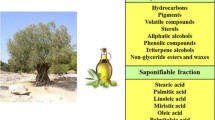Abstract.
Oxidative stress is defined as an imbalance between the oxidant and antioxidant systems of the body, in favour of the oxidants. Oxidative stress produced by free radicals has been linked to the development of several diseases such as cardiovascular, cancer, and neurodegenerative diseases. Olive oil is the main source of fat of the Mediterranean diet which has been shown to be effective against oxidative stress associated diseases and also with the ageing. Besides its richness in monounsaturated fatty acid, the oleic acid, olive oil contains minor components with antioxidant properties. Here, we update the state of the art, and degree of evidence, of the body of knowledge concerning the protective role on lipids and lipid oxidative damage in humans of the olive oil phenolic compounds.
Similar content being viewed by others
Author information
Authors and Affiliations
Corresponding author
Additional information
Received 14 May 2008; accepted 19 June 2008
Rights and permissions
About this article
Cite this article
Covas, MI. Bioactive effects of olive oil phenolic compounds in humans: reduction of heart disease factors and oxidative damage. Inflammopharmacol 16, 216–218 (2008). https://doi.org/10.1007/s10787-008-8019-6
Published:
Issue Date:
DOI: https://doi.org/10.1007/s10787-008-8019-6




